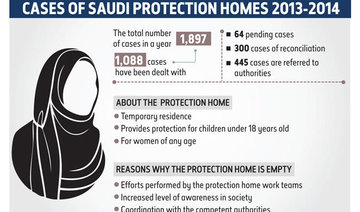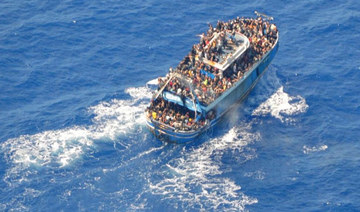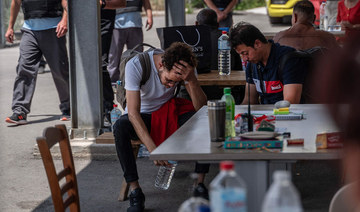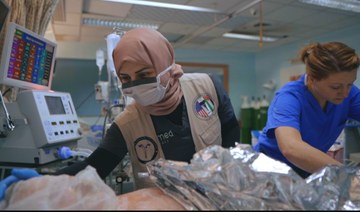TUNIS: After years of “manipulation” by her husband, mother of two Sameh is filing for divorce, thanks to a new Tunisian law broadening the definition of violence against women.
The law, passed in July, entered into force on February 1, finally providing Sameh with the tool she needs to divorce her husband who she says has been psychologically and financially abusing her.
For the past 15 years, Sameh, a teacher and 45-year-old mother of two teenage girls, has been forced to hand over her entire salary to her husband.
She told AFP it took her that long to realize that he had been “manipulating” her, but when she woke up to the reality she decided to act.
But since then, her husband has started provoking her, she said during a meeting at a help center for women victims of violence set up by the Tunisian Association of Democratic Women (AFTD).
“He wants to drive me crazy,” said Sameh, who declined to give her full name.
Her husband would whisper insults into her ear to try to make her snap in front of their teenage daughters.
Her eldest daughter has sensed the tensions and lately began to hurt herself by lacerating her skin.
“I am psychologically exhausted,” said Sameh, adding that she has been taking anti-depressants.
Sameh said she had tried to file for divorce two years ago but her husband refused, and she was afraid of being separated from her daughters and of ending up penniless out on the street.
“It’s very difficult to prove psychological abuse and even then, there was a risk it would not be accepted,” as a cause for divorce by the authorities, she said.
But the new law has changed all that for Sameh, and other victims of domestic abuse.
“When I heard about this law I said to myself, ‘This will bring me justice’,” she said, adding she would file for divorce on moral and financial grounds.
The law considerably widens the definition of unacceptable violence against women.
It recognizes physical, moral and sexual abuse as well as abuse in the form of financial exploitation.
“It is real progress... that could change lives,” said Ahlef Belhadj of the AFTD association.
She said the July law was the result of 25 years of campaigning by Tunisian human rights activists.
Tunisia is seen as a pioneer of women’s rights in the Arab world.
The North African country, birthplace of the Arab Spring protests that ousted several autocratic rulers, adopted a new constitution in 2014 which guarantees equality between men and women.
Article 21 of the constitution states: “All citizens, male and female, have equal rights and duties, and are equal before the law without any discrimination.”
A Personal Status Code adopted in 1956 abolished polygamy, by which a Muslim man can have up to four wives, and repudiation, or the man’s right to terminate a marriage unilaterally.
Nevertheless, in Tunisia one woman out of two has been the victim of abuse, according to official estimates.
“This is only the tip of the iceberg,” said Belhadj.
The new law is seen by many as a landmark step to protect women’s rights because it criminalizes sexual harassment in public places and the employment of children as domestic workers.
It also slaps fine on employers who pay women less than their male counterparts.
However, Belhadj said there is still a lot left to be done and that more funding needs to be allocated to carry it through.
“It’s not enough to pass laws, we must make sure of the conditions of their implementation.”
Human Rights Watch said the law stipulates the creation of shelters for women victims of violence but does not provide for a mechanism to fund them.
Meanwhile, Tunisia’s interior ministry has set up two units tasked with investigating violence against women.
Radhia Jerbi, president of the National Union of Tunisian Women, said the next steps were to spread the word about the new law across the country and to persuade skeptics.
“The problem is our mentality,” she said.
New law brings hope to abused Tunisia women
New law brings hope to abused Tunisia women
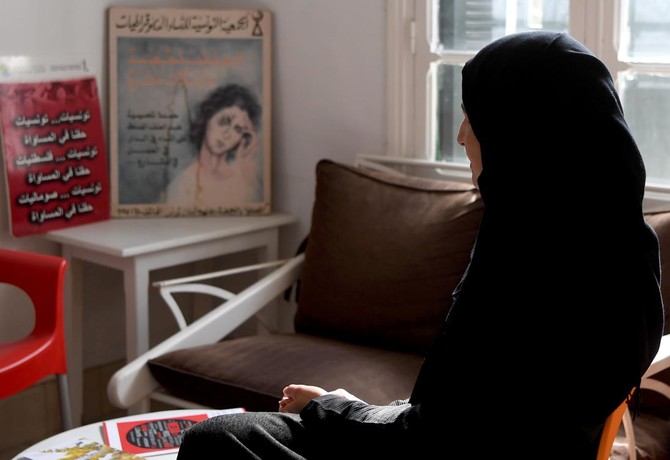
Greek defense team says 9 Egyptians accused of causing deadly shipwreck were misidentified as crew

- The nine are due to go on trial in Kalamata on May 21 on a series of charges, including migrant smuggling, participation in a criminal organization and causing a deadly shipwreck
- They face multiple life sentences if convicted
ATHENS: The legal defense team for nine Egyptian men due to go on trial in southern Greece next week accused of causing one of the Mediterranean’s deadliest shipwrecks said Thursday they will argue that Greece has no jurisdiction in the case, and insisted their clients were innocent survivors who have been unjustly prosecuted.
The nine, whose ages range from early 20s to early 40s, are due to go on trial in the southern city of Kalamata on May 21 on a series of charges, including migrant smuggling, participation in a criminal organization and causing a deadly shipwreck. They face multiple life sentences if convicted.
The Adriana, an overcrowded fishing trawler, had been sailing from Libya to Italy with hundreds of asylum-seekers on board when it sank on June 14 in international waters off the southwestern coast of Greece.
The exact number of people on board has never been established, but estimates range from around 500 to more than 700. Only 104 people survived — all men and boys from Syria, Egypt, Pakistan and two Palestinians — and about 80 bodies were recovered. The vessel sank in one of the Mediterranean’s deepest areas, making recovery efforts all but impossible.
The Greek lawyers who make up the defense team spoke during a news conference in Athens on Thursday. They maintained their clients’ innocence, saying all nine defendants had been paying passengers who had been misidentified as crew members by other survivors who gave testimonies under duress just hours after having been rescued.
The nine “are random people, smuggled people who paid the same amounts as all the others to take this trip to Italy aiming for a better life, and they are accused of being part of the smuggling team,” lawyer and defense team member Vicky Aggelidou said.
Dimitris Choulis, another lawyer and member of the legal team, said that Greek authorities named the defendants as crew members following testimonies by nine other survivors who identified them for having done things as simple as handing bottles of water or pieces of fruit to other passengers.
“For nearly a year now, nine people have been in prison without knowing what they are in prison for,” Choulis said.
“For me, it is very sad to visit and see people in prison who do not understand why they are there,” he added.
While the Adriana was sailing in international waters, the area was within Greece’s search and rescue zone of responsibility. Greece’s coast guard had been shadowing the vessel for a full day without attempting a rescue of those on board. A patrol boat and at least two merchant ships were in the vicinity when the trawler capsized and sank.
In the aftermath of the sinking, some survivors said the coast guard had been attempting to tow the boat when it sank, and rights activists have accused Greek authorities of triggering the shipwreck while attempting to tow the boat out of Greece’s zone of responsibility.
Greek authorities have rejected accusations of triggering the shipwreck and have insisted the trawler’s crew members had refused to accept help from the nearby merchant ships and from the Greek coast guard.
A separate investigation being carried out by Greece’s naval court hasn’t yet reached any conclusion, and the defense team hasn’t been given any access to any part of it.
The Egyptians’ defense team also argues that because the shipwreck occurred in international waters, Greek courts don’t have jurisdiction to try the case, and the defense will move to have the case dismissed on those grounds when the trial opens in Kalamata next week.
Greece lies along one of the most popular routes into the European Union for people fleeing war and poverty in the Middle East, Africa and Asia. While most of those cross into the country’s eastern Aegean Sea islands from the nearby Turkish coast, others try to skirt Greece altogether and head from north Africa to Italy across the longer and more dangerous Mediterranean route.
On Thursday, Greece’s coast guard said that 42 people had been rescued and another three were believed to be missing after a boat carrying migrants sent out a distress call while sailing south of the Greek island of Crete.
Officials said they were alerted by the Italian coast guard overnight about a boat in distress 27 nautical miles (31 miles or 50 kilometers) south of Crete. Greece’s coast guard said that 40 people were rescued by nearby ships, and another two were rescued by a Greek navy helicopter.
A search and rescue operation was underway for three people reported by survivors as still missing. It wasn’t immediately clear what kind of vessel the passengers had been on, or why the boat sent out a distress call.
Turkiye convicts former pro-Kurdish party officials over Kobani protests

- Yuksekdag was sentenced to more than 30 years in prison
- The court has not yet ruled on the HDP co-leader Selahattin Demirtas
ANKARA: A Turkish court convicted former leading officials from the pro-Kurdish HDP party, including co-leader Figen Yuksekdag, on Thursday for instigating 2014 protests triggered by a Daesh attack on the Syrian Kurdish town of Kobani.
The verdict was likely to fuel political tensions in Turkiye around the Peoples’ Democratic Party (HDP), which is facing potential closure in a separate court case and has been succeeded in parliament by another pro-Kurdish party.
In total, Yuksekdag was sentenced to more than 30 years in prison. The court has not yet ruled on the HDP co-leader Selahattin Demirtas.
Thirty-seven people died in the 2014 protests, which were triggered by accusations that Turkiye’s army stood by as the ultra-hard-line Daesh militants besieged Kobani, a Syrian border town in plain view of Turkiye.
Those convicted were among 108 defendants, including senior HDP figures, charged with 29 offenses including homicide and harming the unity of the Turkish state. The HDP denied the charges.
Israel says more troops to ‘enter Rafah’ as operations intensify

- Israeli forces took control earlier in May of the Gaza side of the Rafah crossing with Egypt
- 600,000 people have fled Rafah since military operations intensified: UNRWA
JERUSALEM: Israel’s Defense Minister Yoav Gallant said that more troops would “enter Rafah” as military operations intensify in Gaza’s far-southern city, in remarks issued by his office Thursday.
The operation “will continue as additional forces will enter” the Rafah area, Gallant said, adding that “several tunnels in the area have been destroyed by our troops... this activity will intensify.”
“Hundreds of [terror] targets have already been struck, and our forces are manoeuvring in the area,” he said according to a statement released by his office after he visited Rafah the previous day.
Israeli forces took control earlier in May of the Gaza side of the Rafah crossing with Egypt, in a push launched in defiance of US warnings that around 1.4 million civilians sheltering there could be caught in the crossfire.
The United Nations agency for Palestinian refugees, UNRWA, has said “600,000 people have fled Rafah since military operations intensified” in Rafah.
Israeli Prime Minister Benjamin Netanyahu has vowed to launch a full-scale ground operation in Rafah in a bid to dismantle the remaining battalions of Hamas.
Gallant said that the military’s offensive against Hamas had hit the militant group hard.
“Hamas is not an organization that can reorganize, it does not have reserve troops, it has no supply stocks and no ability to treat the terrorists that we target,” he said.
“The result is that we are wearing Hamas down.”
However, Israel’s top ally the United States has warned that it had not seen any credible Israeli plan to protect civilians in Rafah.
Secretary of State Antony Blinken told NBC on Sunday that “Israel’s on the trajectory, potentially, to inherit an insurgency with many armed Hamas left or, if it leaves, a vacuum filled by chaos, filled by anarchy and probably refilled by Hamas.”
The Gaza war broke out after Hamas’s unprecedented October 7 attack on southern Israel which resulted in the deaths of more than 1,170 people, mostly civilians, according to an AFP tally based on Israeli official figures.
Israel’s military retaliation has killed at least 35,272 people, mostly civilians, according to the health ministry in Hamas-ruled Gaza.
Tunisia blasts foreign criticism of arrests as ‘interference’

- Several prominent Tunisian pundits, journalists, lawyers and civil society figures have been arrested in recent days
- Late Saturday, masked police raided the Tunisian bar association headquarters and forcibly arrested lawyer Sonia Dahmani
TUNIS: Tunisian President Kais Saied on Thursday denounced foreign “interference” following international criticism of a recent flurry of arrests of political commentators, lawyers and journalists in the North African country.
Saied, who in 2021 orchestrated a sweeping power grab, ordered the foreign ministry to summon diplomats and “inform them that Tunisia is an independent state.”
Speaking during a televised meeting, the president told Mounir Ben Rjiba, state secretary to the foreign ministry, to “summon as soon as possible the ambassadors of a number of countries,” without specifying which ones.
Ben Rjiba was asked to “strongly object to them that what they are doing is a blatant interference in our internal affairs.”
“Inform them that Tunisia is an independent state that adheres to its sovereignty,” Saied added.
“We didn’t interfere in their affairs when they arrested protesters... who denounced the war of genocide against the Palestinian people,” he added, referring to demonstrations on university campuses in the United States and elsewhere over the Israel-Hamas war.
Several prominent Tunisian pundits, journalists, lawyers and civil society figures have been arrested in recent days, many of whom over a decree that punishes “spreading false information” with up to five years in prison.
Since Decree 54 came into force with Saied’s ratification in 2022, more than 60 journalists, lawyers and opposition figures have been prosecuted under it, according to the National Union of Tunisian Journalists.
Late Saturday, masked police raided the Tunisian bar association headquarters and forcibly arrested lawyer Sonia Dahmani over critical comments she had made on television.
On Monday police entered the bar association again and arrested Mehdi Zagrouba, another lawyer, following a physical altercation with officers. Zagrouba was subsequently hospitalized.
The arrests have sparked Western condemnation.
The European Union on Tuesday expressed concern that Tunisian authorities were cracking down on dissenting voices.
France denounced “arrests, in particular of journalists and members of (non-governmental) associations,” while the United States said they were “in contradiction” with “the universal rights explicitly guaranteed by the Tunisian Constitution.”
The media union said Wednesday that Decree 54 was “a deliberate attack on the essence of press freedom and a vain attempt to intimidate journalists and media employees and sabotage public debate.”
NGOs have decried a rollback of freedoms in Tunisia since Saied — who was elected democratically in October 2019 with a five-year mandate — began ruling by decree following the July 2021 power grab.
Egypt rejects Israeli plans for Rafah crossing, sources say

- An Israeli official said a delegation traveled to Egypt amid rising tension between the two countries
CAIRO: Egypt has rejected an Israeli proposal for the two countries to coordinate to re-open the Rafah crossing between Egypt’s Sinai Peninsula and the Gaza Strip, and to manage its future operation, two Egyptian security sources said.
Officials from Israeli security service Shin Bet presented the plan on a visit to Cairo on Wednesday, amid rising tension between the two countries following Israel’s military advance last week into Rafah, where hundreds of thousands of Palestinians displaced by war have been sheltering.
The Rafah crossing has been a main conduit for humanitarian aid entering Gaza, and an exit point for medical evacuees from the territory, where a humanitarian crisis has deepened and some people are at risk of famine. Israel took operational control of the crossing and has said it will not compromise on preventing Hamas having any future role there.
The Israeli proposal included a mechanism for how to manage the crossing after an Israeli withdrawal, the security sources said. Egypt insists the crossing should be managed only by Palestinian authorities, they added.
An Israeli official who requested anonymity said the delegation traveled to Egypt “mainly to discuss matters around Rafah, given recent developments,” but declined to elaborate.
Egypt’s foreign press office did not immediately respond to a request for comment.
Egypt and Israel have a long-standing peace treaty and security cooperation, but the relationship has come under strain during the Gaza war, especially since the Israeli advance around Rafah.
The two countries traded blame this week for the border crossing closure and resulting blockage of humanitarian relief.
Egypt says Rafah’s closure is due solely to the Israeli military operation. It has warned repeatedly that Israel’s offensive aims to empty out Gaza by pushing Palestinians into Egypt.
Israeli government spokesperson David Mencer said on Wednesday that Egypt had rejected an Israeli request to open Rafah to Gazan civilians who wish to flee.
The Israeli delegation also discussed stalled negotiations for a ceasefire and hostage release in Gaza during their Cairo visit, but did not convey any new messages, the Egyptian sources said. Egypt has been a mediator in the talks, along with Qatar and the United States.
Israel’s Gaza offensive has killed more than 35,000 Palestinians, according to Gaza health officials, with at least 82 killed on Tuesday in the highest single-day toll for weeks.
Hamas-led gunmen killed some 1,200 people and abducted 253 in their Oct. 7 raid into Israel, according to Israeli tallies.



